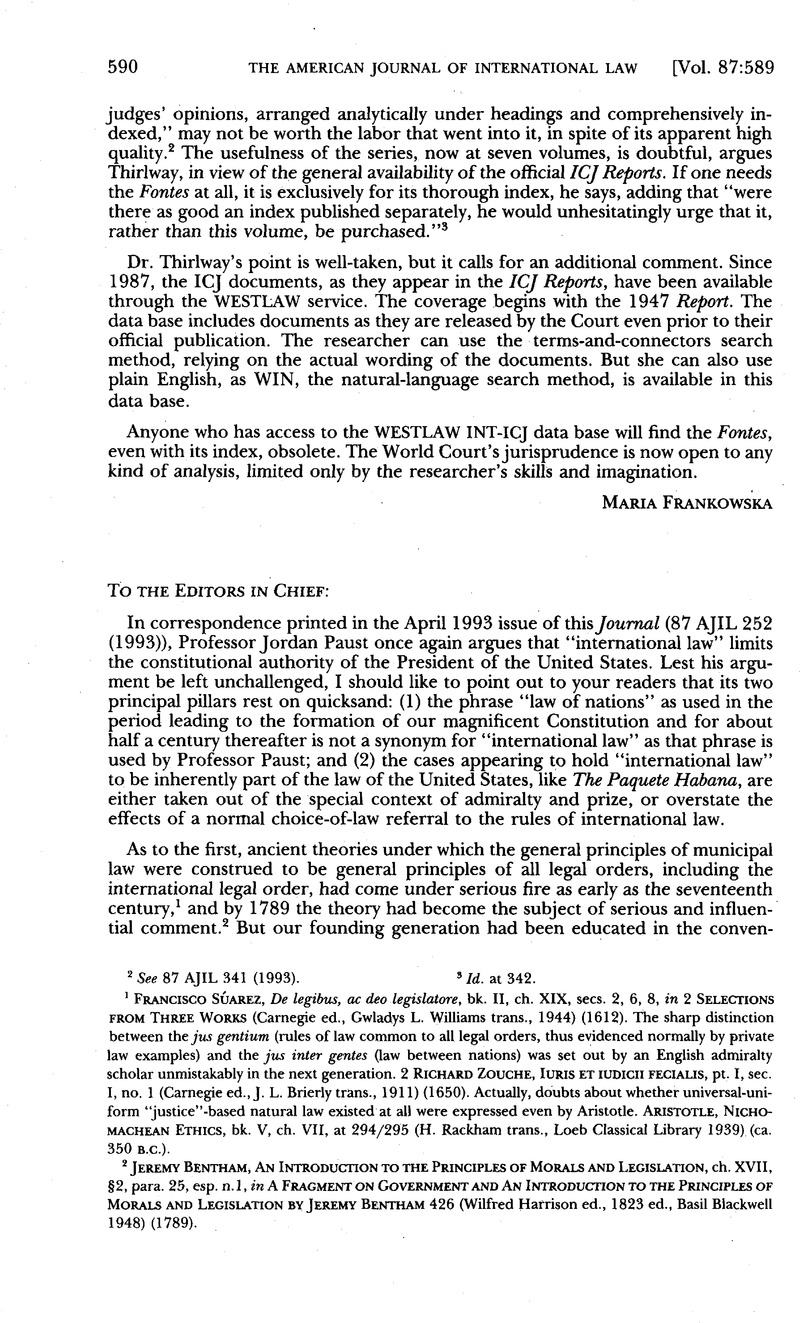No CrossRef data available.
Article contents
Abstract

- Type
- Notes and Comments
- Information
- Copyright
- Copyright © American Society of International Law 1993
References
1 Francisco Súarez, De legibus, ac deo legislatore, bk. II, ch. XIX, sees. 2, 6, 8, in 2 Selections from Three Works (Carnegie ed., Gwladys L. Williams trans., 1944) (1612). The sharp distinction between the jus gentium (rules of law common to all legal orders, thus evidenced normally by private law examples) and the jus inter gentes (law between nations) was set out by an English admiralty scholar unmistakably in the next generation. 2 Richard Zouche, Iuris et Iudicii Fecialis, pt. I, sec. I, no. 1 (Carnegie ed., J. L. Brierly trans., 1911) (1650). Actually, doubts about whether universal-uniform “justice”-based natural law existed at all were expressed even by Aristotle. Aristotle, Nichomachean Ethics, bk. V, ch. VII, at 294/295 (H. Rackham trans., Loeb Classical Library 1939) (ca. 350 B.C.).
2 Jeremy Bentham, An Introduction to the Principles of Morals and Legislation, ch. XVII, §2, para. 25, esp. n. 1, in A Fragment on Government and An Introduction to the Principles of Morals and Legislation by Jeremy Bentham 426 (Wilfred Harrison ed., 1823 ed., Basil Blackwell 1948) (1789).
3 The leading legal text of the time, and the one familiar to those of our constitutional generation who were lawyers, was, of course, William Blackstone, Commentaries on the Laws of England (1765–1769). Volume 4 (1769) is the only one pertinent to this discussion. See vol. 4, ch. V: “Of Offences Against the Laws of Nations.” Blackstone defined the “law of nations” to include all rules deducible by “natural reason” and adopted “by universal consent among all the civilized inhabitants of the world.” The major area for its play was in transnational trade,
mercantile questions, such as bills of exchange and the like; in all marine causes relating to freight, average, demurrage, insurances, bottomry, and others of a similar nature; the law-merchant … to prizes, to shipwrecks, to hostages and ransom-bills, there is no other rule of decision… . But though in civil transactions and questions of property between the subjects of different states the law of nations has much scope … offences against the law of nations … are principally incident to whole states or nations: in which case recourse can only be had to war ….
See 4 William Blackstone, Commentaries on the Laws of England: Of Public Wrongs 1474–75 (William Draper Lewis ed., Rees Welsh & Co. 1897). Is this what Professor Paust has in mind as the guiding spirit of our Founding Fathers? If so, what happened to the notion of “consent”? But there is much in Blackstone that seems self-contradictory to a modern analyst, and strains in the system that resulted from too easy an adoption of his legal model probably contributed to the massive shift in legal theory in the next generation.
4 Joseph Story, Commentaries on the Conflict of Laws, Foreign and Domestic, in Regard to Contracts, Rights, and Remedies (1834). For a summary analysis of Story’s role in this shift, see Alfred P. Rubin, Private and Public History; Private and Public Law, 82 ASIL Proc 30 (1988).
5 For a criticism of the Court’s approach to this source of law, see Richard B. Lillich, The Rigidity of Barcelona, 65 AJIL 522, esp. 529–31 (1971). Lillich seems to have confused the ICJ’s choice-of-law referral to municipal corporation law with what he argues should have been a referral to municipal corporation law as a source of international law dealing with stockholders’ claims. Some arbitral tribunals have found general principles of law a fertile source of law in some cases. See Wolfgang Friedmann, The Uses of “General Principles” in the Development of International Law, 57 AJIL 279 (1963). The indispensable work, pointing out the limits of the approach, is still Hersch Lauterpacht, Private Law Sources and Analogies of International Law (1927).
6 Harter (Carriage of Goods by Sea) Act of 1893, 27 Stat. 445 (46 U.S.C. app. §§190–195 (1988)); the Jones (Merchant Marine) Act of 1920, ch. 250, 41 Stat. 988, often supplemented and amended, now dispersed throughout 46 U.S.C.
7 Occam’s razor, otherwise called the Law of Parsimony, “Essentia non sunt multiplicanda praeter necessitatem” (Essences [assumptions] are not to be multiplied unless necessary). William of Occam (Ockham) was an English monk and philosopher who died in 1349. See 19 Encyclopedia Britannica 965–66 (11th ed. 1911).
8 Even then, there can be problems and different interpretations. For example, was the United States Constitution, adopted as if a treaty in 1788, not to be subject to denunciation as if a treaty, by the “sovereign” states composing the legal union in 1861?


